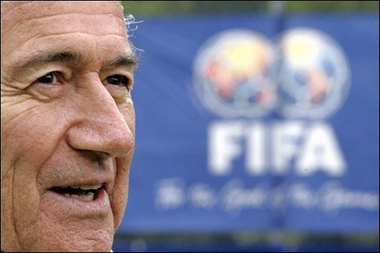Blatter hints at China bid for World Cup
(AFP)Updated: 2007-03-01 09:01
LONDON (AFP) - FIFA President Sepp Blatter on Wednesday placed the United States in pole position to host the 2018 World Cup and hinted that China could enter the race to secure the tournament.
In comments that cast doubt on England and Australia's chances of winning the 2018 finals, Blatter said he wanted to extend the current system under which the World Cup is rotated between Africa, Asia, Europe, North, Central America and the Caribbean, and South America beyond 2014.
 FIFA president Sepp Blatter, seen here in 2006, placed the United States in pole position to host the 2018 World Cup and hinted that China could enter the race to secure the tournament.[AFP/file] 
|
That would make the United States, which has already declared its interest in hosting the 2018 tournament, the best-placed country with the Asian confederation, which now includes Australia, next in line.
Although Australia is the only declared candidate from Asia, Blatter revealed that Chinese football officials had been sounding out the FIFA hierarchy about the possibility of following up the 2008 Beijing Olympics by hosting a World Cup.
"In the discussions we have had in Zurich about the Olympic football tournament, the general secretary of the Chinese federation has been speaking about the possibility of organising the World Cup," Blatter revealed at a media briefing in London.
"I'm not a prophet, I cannot see where the World Cup is going but you have many times in history when a country had an Olympics and then the World Cup."
Blatter's comments on rotation will come as a blow to the British government, which has already announced that it will back a bid for England to host the World Cup in 2018 on the assumption that the tournament will be coming back to Europe that year.
A decision on the future of rotation will not be made until a FIFA executive committee meeting in South Africa at the end of this year.
But Blatter made it clear he favoured a system which would mean the World Cup, which was hosted by Germany last year, would not return to Europe until 2022.
"The situation is that we have decided in the FIFA executive committee that rotation shall be installed and we have made the rotation up to and including the 2014 World Cup," Blatter said.
"Now there must be now a new approach in this rotation. The executive committee must decide whether the rotation should include all the confederations and if all the confederations should be in the rotation, then the next one should be in CONCACAF (which covers north and central America and the Caribbean).
"But the executive committee can also say that the Americas can be considered as one but we will maintain the rotation, and then it would be Asia again.
"Australia has now joined Asia and there is no chance for Oceania (which has been reduced to New Zealand and the Pacific islands) to organise a World Cup with the remaining members.
"I can understand the eagerness of England to host the World Cup again for the first time since 1966 but the situation is as it is now."
Blatter, who is expected to be re-elected as President in June, stressed that he could be over-ruled by the FIFA executive committee, but said he was personally "inclined to go with a kind of rotation."
The FIFA President, who has a good record of getting what he wants within the organisation, went on to argue that, without rotation, the World Cup would never have been awarded to Africa.
He reiterated his view that 2010 host South Africa is, after some initial teething problems, "definitely on the right track" for a successful tournament.
FIFA has already agreed that the 2014 tournament should be in South America with Brazil expected to be the hosts. Blatter appeared to rule out a rival bid from Colombia by describing their approach as "more of a public relations presentation of the country."
|
||
|
||
|
|